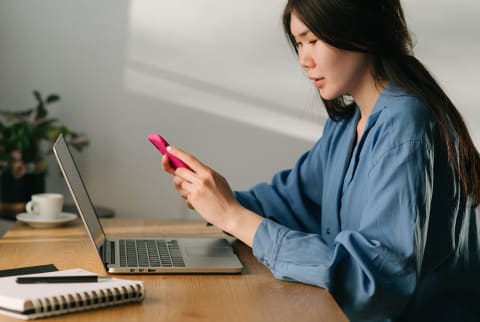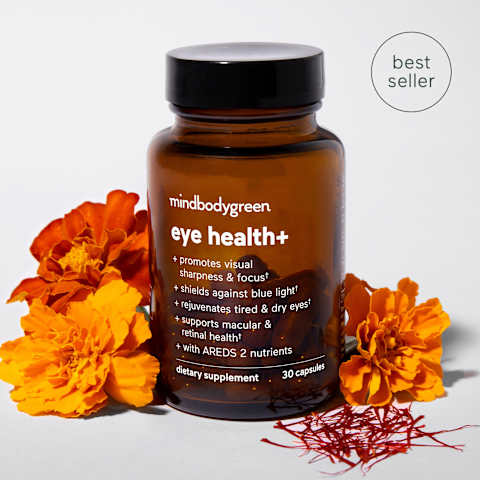Advertisement
5 Ways To Combat Screen Fatigue & Rejuvenate Your Eyes



I'm looking at screens for a large portion (read: most) of my day, and I wouldn't be surprised if you are too.
Screens are a part of our daily lives—we work in front of a computer screen, use our phone screen to catch up on news and connect with friends, and then end our day watching shows on our television screens.
As crazy as it seems, it's not at all abnormal for individuals to spend almost every waking moment of their day looking at a screen. The thing is, our eyes aren't equipped to deal with 24/7 use of digital devices, and too much screen time can lead to an increasingly common health concern called screen fatigue.
What is screen fatigue?
Screen fatigue is when the muscles around our eyes get strained after long bouts of screen use without any rest. Essentially, it's related to "eye strain"—a generic term used to describe eye discomfort, optometrist Jeffrey Anshel, O.D., FAAO, says.
"It has as many definitions as people who complain about it. Everyone seems to have their own description," Anshel explains, adding, "If it occurs related to display viewing, it is typically described as 'digital eye strain.'"
If you've ever worked a 10-hour day on the computer or binge-watched too many episodes of Stranger Things in a row, you know firsthand how staring at a screen can affect the health of your eyes, brain, and mental well-being.
"Excessive display viewing can cause poor performance (in school and work)," Anshel shares. He goes on to say that many people blame blue light for this correlation, but much of the blue light we experience throughout the day is from the sun (i.e., natural blue light), so blue light isn't the main reason we should be concerned about overuse of electronic displays.
"Blue light does affect our sleep patterns, but the eye strain associated with computer viewing is more likely caused by the demands of the task exceeding the visual abilities of the person," Anshel says.
Biologically speaking, our vision physiology and processing limits are simply incongruent with the prolonged duration of modern screen usage.
How digital eye strain occurs.
Our eyes are constantly working to adjust their focus from one distance to another as we switch between looking at things close to us and things that are far away. The ciliary muscles control our lens, which allows us to focus our vision on any given object.
Our ciliary muscles relax when looking at objects far away and contract to focus on things close up (like screens). So, when we're staring at our screens for too long, we're basically keeping our eyes in a visual squat without even realizing it. After all, with actual squats you get that burn sensation feedback to signal your limits.
Who's most susceptible to screen fatigue?
Well, anyone who's in front of a screen for most of their day, particularly those who work at their computers for more than a few hours a day (yikes). Improper ergonomics (i.e., poor posture, sitting too close to or far from the computer screen, and viewing your screen at a suboptimal angle or proximity) can also exacerbate screen fatigue.
But work isn't the only circumstance that can cause digital eye strain. Realistically, any amount of excessive screen time could lead to screen fatigue—including gaming, visual editing (graphic design, video, photography), playing too many games on your phone, and even watching too much television.
In short, we'd all be smart to limit our screen time and give our eyes regularly scheduled breaks from screen use.
Side effects of screen fatigue.
Concerned you may be dealing with digital eye strain? Some screen fatigue clues include:
- Tired eyes (i.e., feeling like you can't keep your eyes open)
- Difficulty concentrating
- Strained neck, shoulders, and/or back
- Eye dryness from lack of blinking
5 ways to combat screen fatigue.
If you're dealing with the effects of screen fatigue, you're not alone. Luckily, there are quite a few things we can do to combat excessive screen use and promote vision health and longevity:
- Take a comprehensive eye supplement: mbg's premium eye health supplement, eye health+, aids recovery from digital eye strain and screen fatigue. Featuring critical vision phytonutrients lutein and zeaxanthin for macular support and photoprotection; astaxanthin to help our eyes focus and refocus (so they can reset and recover); Patagonian maqui berry to hydrate our eyes and reduce shoulder stiffness; and saffron flower to reduce eye pressure and support retinal function, this next-level vegan eye health formula expertly promotes visual performance and eye longevity.*
- Use the 3-B Approach: What's that? "Blink, breathe, and break," Anshel explains. "We blink much less while viewing a display screen than reading or normal distance viewing. We also breathe more erratically when stressed, especially with deadlines and work requirements." And as for the breaks…
- Follow the 20-20-20 Rule: A daily eye care ritual personally developed by Anshel, the "20-20-20 Rule" is the perfect way to give your eyes (specifically, your ciliary muscles) a rest. How does it work? "Every 20 minutes, take just 20 seconds and look 20 feet away," he explains. Simple enough!
- Be mindful of your screen settings: Adjust your screen's brightness, make text bigger if necessary, and utilize night mode settings or blue light glasses (especially during nighttime screen use).
- Get regular eye checkups: The wrong glasses strength can exacerbate the side effects of digital eye strain and screen fatigue. Get your eyes checked regularly (every year or so, depending on your personal eye health history and needs) to ensure your vision is taken care of.
The takeaway.
Unless you plan on living completely off-grid in the woods, there's no escaping some level of daily screen use. Luckily, we can take daily, consistent steps to combat screen fatigue and promote overall eye health.
For an easy, effective way to support vision longevity and promote digital eye strain recovery, consider a targeted eye supplement like mbg's eye health+.* Just one daily capsule gives you clinically researched, full-potency doses of five botanical powerhouse bioactives (i.e., astaxanthin, lutein, zeaxanthin, maqui berry, and saffron flower) that holistically bolster eye health, function, and performance in this digital age!*
